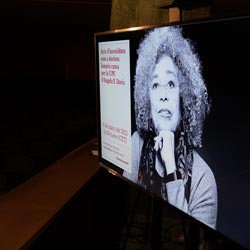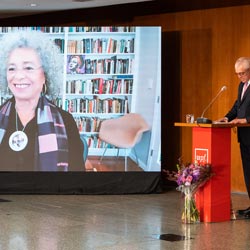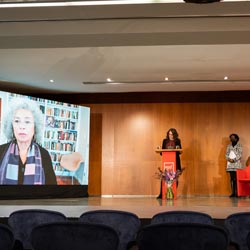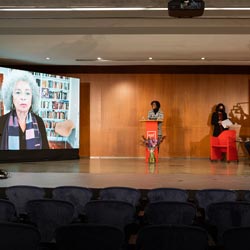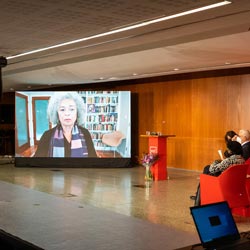A fons
8. In depth
“The role of the university can be central if it recognizes the importance of building community with all the other spaces where knowledge is produced"
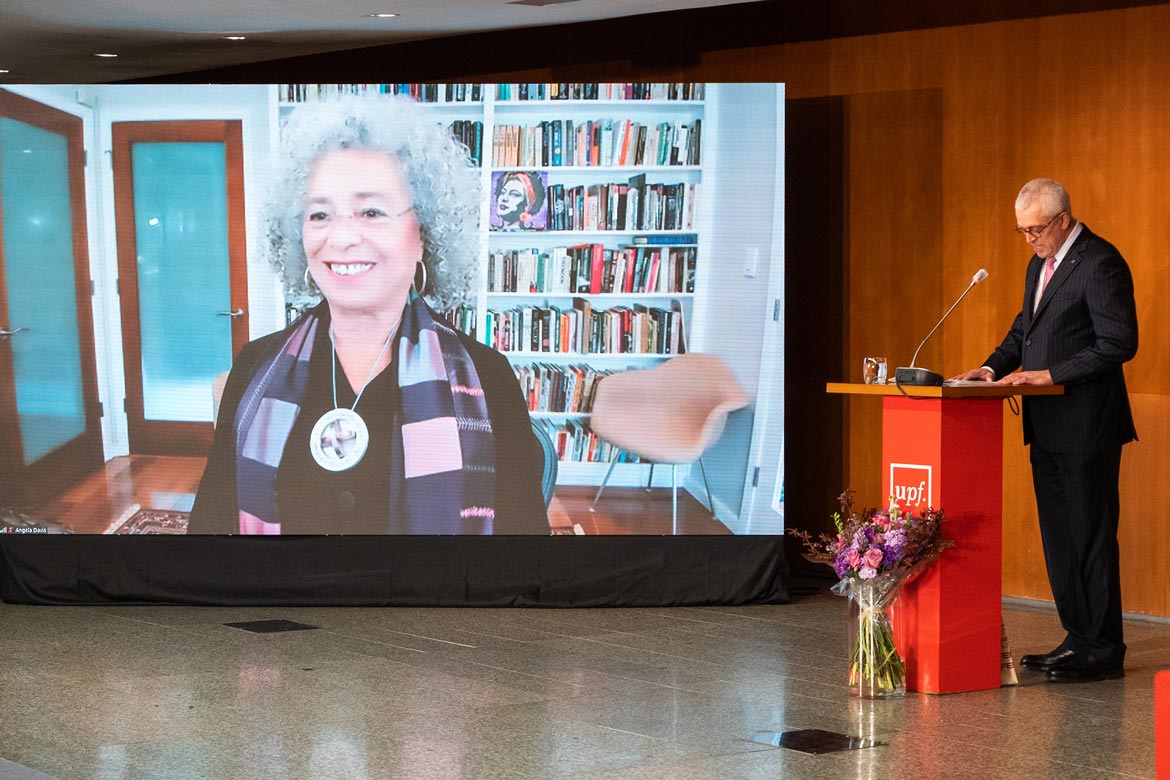
Ten minutes of conversation with Angela Y. Davis, an American political activist and professor emeritus at the University of California, Santa Cruz, are more than enough to leave us with plenty to ponder. The privilege of having her with us live (on screen) last March, for the awarding of her honorary doctorate from UPF, gave us the chance to talk with her about the role of universities as leaders of the social transformation.
Davis was recognized by UPF for her long academic and intellectual career, including her invaluable analyses of the relationships between gender, race and social class, as well as her activism in defence of civil rights, justice, equality and the freedom of individuals.
What do you think should be the role of universities in the fight against inequalities, whether gender or race? And related with that, are feminism and antiracism two sides of the same coin?
Well, first of all, thank you for posing this question. And like many others, I believe that universities have a crucial role to play, and particularly since universities are the site of the production of knowledge, the professionalized production of knowledge.
Knowledge is really only valuable to the extent that it encourages transformation of those aspects of our worlds that promote exploitation and discrimination. So, universities should be aware of the role that they play in producing and also popularizing this knowledge.
Knowledge is really only valuable to the extent that it encourages transformation of those aspects of our worlds that promote exploitation and discrimination.
Feminism and antiracism are very much interrelated. As a matter of fact, the feminism that I expose cannot really exist without the accompaniment of empty racist impulses, both theoretically and practically. But, of course, many people including Dr Martin Luther King, pointed out that justice is indivisible, that justice for one demands justice for all. And in my context, I’d like to offer a quote from Tony Morrison, who pointed out that “the function of freedom is always to free someone else”.
Did you miss Angela Y. Davis’s acceptance speech as an honorary doctor for UPF?
Excerpts from the laudatio speech
Even though I am the individual recipient, the work that has led you to designate me as being worthy of this high honour has never been the work of a lone individual.
I also thank you for organizing this beautiful ceremony under the very difficult conditions of a global pandemic and a time when you in Catalonia continue your own struggles for justice and equality.
I acknowledge the current historical conjuncture as one of great pain and suffering throughout the world, but at the same time this is also a moment of hope and optimism for the future. I refer to the emerging collective consciousness, of the fact that we in the contemporary world, we who constitute the human population cohabiting this planet along with other animal species, are called upon to prevent the conflagration that is inevitable if we do not discover ways of transforming our manner of living on this planet.
For the first time in human history, vast numbers of people in many parts of the world are seriously reflecting on the structural consequences of colonialism and slavery.
This is a moment of intense suffering not only because of the direct consequences of the covid-19 virus but because the planet is afflicted with this virus at a peak moment of capitalism at a time when the planet’s wealth has become increasingly concentrated in the hands of relatively few people.
And at a time when human institutions that should be devoted to the wellbeing of humans, other animals and indeed of the earth are subordinated to the needs of capital. Therefore, our health crisis here in the US is a crisis produced by the privatization of healthcare.
And to the fact that empty hospital beds are deemed unprofitable by the global capitalist corporations that now dispense medical care.
Our history continues to be haunted by slavery: at virtually every historical juncture when we have collectively considered issues of justice and democracy the question of slavery has arisen.
European countries relied on the wealth produced by the slave trade and they benefited from the racial capitalism that was forged at the intersection of colonial invasions, indigenous genocide and the enslavement of Africans.
The mainstream, white feminist movement in the US has its historical origins in the movement to abolish slavery; many white suffragettes in the 19th century understood their own predicament by comparing the English common law doctrine of couverture that made married women entirely subject to the power of their husbands to the institution of slavery.
Today, when we acknowledge that black lives matter, we are not simply saying that black people deserve justice, equality and freedom. We are pointing out that the positionality of black people in US society is one of the best measures of the meaning of democracy.
Our current efforts to identify and to begin to dismantle structural racism in policing, in prisons, in the healthcare system, in education, in jobs, in housing is a collective effort to ameliorate our society, to break down impediments to democracy.
The history of both prisons and the police has always been the history of efforts to reform prisons and the history of efforts to reform the police.
We would have to be critical of the way in which middle-class white women have come to stand in for all survivors of violence.
Feminist activism must not be afraid to acknowledge its interdisciplinarity, not only academic interdisciplinarity but a movement-based interdisciplinarity.

